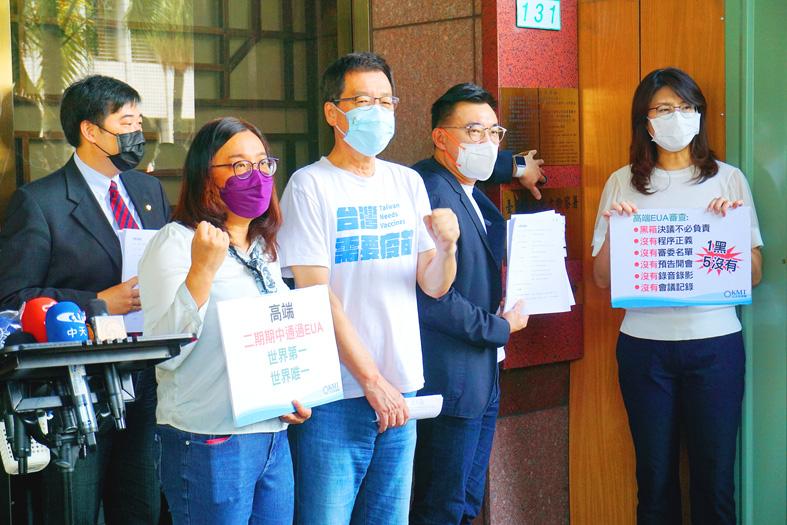The Chinese Nationalist Party (KMT) yesterday filed a lawsuit against Minister of Health and Welfare Chen Shih-chung (陳時中) and Food and Drug Administration (FDA) Director Wu Shou-mei (吳秀梅) alleging corruption in the decision to issue an emergency use authorization (EUA) for the COVID-19 vaccine developed by the Medigen Vaccine Biologic Corp (高端疫苗生物製劑).
The FDA had bypassed standard procedures and, in broad defiance of public and international opinion, decided to approve the vaccine, the KMT said.
Citing FDA data, KMT caucus secretary-general Cheng Li-wun (鄭麗文) said that Medigen started producing vaccines last month, before it received the EUA, which is evidence that the company was given assurances that its vaccine would be approved and made available for use by next month.

Photo: CNA
“We have become the only nation to approve an EUA for a vaccine that has not passed phase 3 clinical trials,” Cheng said.
Medigen yesterday said that it had received approval to conduct phase 3 clinical trials on 1,000 people in Paraguay.
KMT Chairman Johnny Chiang (江啟臣) cited the vaccine approval process in the US, saying that the process is recorded and that its review processes are transparent.
Taiwan, on the other hand, had not recorded the review process, he said, adding that the public does not know who attended the meeting, or what kind of opposition was voiced.
“We have set the lowest bar for vaccine approval worldwide,” Chiang said.
KMT Disciplinary Committee director Yeh Ching-yuan (葉慶元), who is the party’s legal representative, said that the procedures to approve domestic vaccines went against past practice, despite Taiwan having access to international vaccines and having no immediate need for them.
The FDA was guilty of corruption as it forced through the approval of the EUA by replacing half of the academics on the panel of specialists, Yeh said.
In response, Democratic Progressive Party caucus secretary-general Lo Chih-cheng (羅致政) said that the legislature would declassify and make public the minutes of the specialists’ meeting within two weeks.
At the specialists’ meeting, 18 members voted to approve the vaccine, one voted for further discussion after asking for more information and one voted to not approve the vaccine, Wu said on Monday, adding that the convener of the meeting was not allowed to vote.
Under the EUA, the company must provide a safety report every month, she said.

ACTION PLAN: Taiwan would expand procurement from the US and encourage more companies to invest in the US to deepen bilateral cooperation, Lai said The government would not impose reciprocal tariffs in retaliation against US levies, President William Lai (賴清德) said yesterday, as he announced five strategies to address the issue, including pledging to increase Taiwanese companies’ investments in the US. Lai has in the past few days met with administrative and national security officials, as well as representatives from various industries, to explore countermeasures after US President Donald Trump on Wednesday last week announced a 32 percent duty on Taiwanese imports. In a video released yesterday evening, Lai said that Taiwan would not retaliate against the US with higher tariffs and Taiwanese companies’ commitments to

Intelligence agents have recorded 510,000 instances of “controversial information” being spread online by the Chinese Communist Party (CCP) so far this year, the National Security Bureau (NSB) said in a report yesterday, as it warned of artificial intelligence (AI) being employed to generate destabilizing misinformation. The bureau submitted a written report to the Legislative Yuan in preparation for National Security Bureau Director-General Tsai Ming-yen’s (蔡明彥) appearance before the Foreign Affairs and National Defense Committee today. The CCP has been using cognitive warfare to divide Taiwanese society by commenting on controversial issues such as Taiwan Semiconductor Manufacturing Co’s (TSMC, 台積電) investments in the

HELPING HAND: The steering committee of the National Stabilization Fund is expected to hold a meeting to discuss how and when to utilize the fund to help buffer the sell-off The TAIEX plunged 2,065.87 points, or 9.7 percent, to close at 19,232.35 yesterday, the highest single-day percentage loss on record, as investors braced for US President Donald Trump’s tariffs after an extended holiday weekend. Amid the pessimistic atmosphere, 945 listed companies led by large-cap stocks — including Taiwan Semiconductor Manufacturing Co (TSMC, 台積電), Hon Hai Precision Industry Co (鴻海精密) and Largan Precision Co (大立光) — fell by the daily maximum of 10 percent at the close, Taiwan Stock Exchange data showed. The number of listed companies ending limit-down set a new record, the exchange said. The TAIEX plunged by daily maxiumu in just

‘COMPREHENSIVE PLAN’: Lin Chia-lung said that the government was ready to talk about a variety of issues, including investment in and purchases from the US The National Stabilization Fund (NSF) yesterday announced that it would step in to staunch stock market losses for the ninth time in the nation’s history. An NSF board meeting, originally scheduled for Monday next week, was moved to yesterday after stocks plummeted in the wake of US President Donald Trump’s announcement of 32 percent tariffs on Taiwan on Wednesday last week. Board members voted to support the stock market with the NT$500 billion (US$15.15 billion) fund, with injections of funds to begin as soon as today. The NSF in 2000 injected NT$120 billion to stabilize stocks, the most ever. The lowest amount it